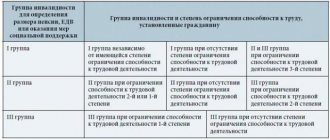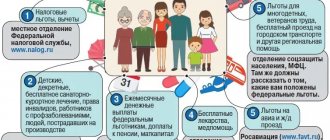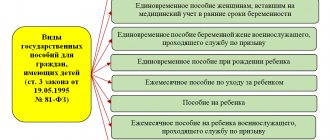Part-time work
The employer is obliged to establish a part-time working day (shift) or a part-time working week at the request of one of the parents (guardian, trustee) who has a disabled child under the age of 18 (Part 1 of Article 93 of the Labor Code of the Russian Federation).
To do this, the employee must write a statement.
To confirm his right, the employee must provide the employer with:
- birth (adoption) certificate of a child or a document confirming the establishment of guardianship or trusteeship of a disabled child;
- a certificate confirming the fact of disability, issued by the bureau of medical and social examination;
- documents confirming the place of residence (stay or actual residence) of a disabled child;
- other documents.
Part-time working time is established for a period convenient for the employee, but no more than for the period of existence of the circumstances that were the basis for the mandatory establishment of part-time working time, that is, for the period of time that the employee’s child has the status of “disabled child.”
Employment (hiring)
The Labor Code directly prohibits an employer from refusing to hire women for reasons related to the presence of children, regardless of whether they are disabled or not (part three of Article 64 of the Labor Code of the Russian Federation). This rule also applies to fathers raising children without a mother, guardians and trustees of minors (Article 264 of the Labor Code of the Russian Federation). When hiring, an employee is required to present a number of mandatory documents to the employer, and he is not obliged to inform the company about the health status of his child (Article 65 of the Labor Code of the Russian Federation).
Labor legislation provides for a number of benefits and guarantees for employees raising disabled children. In order to use them, the employee must present the child’s birth certificate and documents confirming his disability. Depending on the degree of impairment of body functions and limitations in life activity, children under 18 years of age are assigned the category “disabled child” (Part 3 of Article 1 of Federal Law No. 181-FZ of November 24, 1995, hereinafter referred to as Law No. 181-FZ)
To confirm the child’s disability, the employee must provide the employer with a certificate of the established form with the decision of the medical and social examination - MSE (Appendix No. 1 to the order of the Ministry of Health and Social Development of Russia dated November 24, 2010 No. 1031n). Disability can be established for a period of one year, two years or until the child reaches the age of 18 years. The specific deadline is indicated in the ITU certificate. Re-examination of children is carried out once during the period for which the child is diagnosed with a disability. Therefore, if the previous certificate has expired and the parents of a disabled child have not submitted a new ITU certificate, they are not provided with benefits at the place of work.
Documents confirming the assignment of disability (certificate, examination report, etc.) must be kept in the employee’s hands; the employer can only keep copies of these documents.
Features of annual leave
One of the parents (guardians, trustees, foster parents) raising a disabled child under the age of 18 has the right to be granted annual paid leave at his request at a time convenient for him (Article 262.1 of the Labor Code of the Russian Federation).
A collective agreement can establish annual additional leaves without pay at a time convenient for them, lasting up to 14 calendar days. Such leave, upon written application of the employee, can be added to the annual paid leave. This leave cannot be transferred to the next working year (Article 263 of the Labor Code of the Russian Federation).
Read in the berator “Practical Encyclopedia of an Accountant”
Providing annual leave
Sick leave
Sick leave when it is necessary to care for a sick disabled child under the age of 15 is paid for the entire period of outpatient treatment or joint stay with the child in a stationary medical institution. At the same time, a limitation has been introduced on the total duration of such periods - no more than 120 calendar days in the current year for all cases of caring for this child (clause 3, part 5, article 6 of the Federal Law of December 29, 2006 No. 255-FZ).
The Supreme Court of the Russian Federation, in Decision dated April 17, 2013 No. AKPI13-178, canceled the effect of paragraph 4 of clause 35 of the Procedure for issuing certificates of incapacity for work (approved by order of the Ministry of Health and Social Development of Russia dated June 29, 2011 No. 624n). This norm linked the payment of sick leave while caring for a child in an inpatient treatment facility with an acute illness or exacerbation of a chronic disease. A certificate of incapacity for work is issued and paid to employees in all cases of being in a hospital with a child.
Additional days off
An employee has the right to be provided with 4 additional paid days off per month to care for disabled children (Part 1 of Article 262 of the Labor Code of the Russian Federation).
The procedure for providing additional paid days off is established by Decree of the Government of the Russian Federation of October 13, 2014 No. 1048.
To be granted additional days off, the employee must also submit a written application.
Read in the berator “Practical Encyclopedia of an Accountant”
Payment for days off to care for a disabled child
Leave for parents of a disabled child under the Labor Code of the Russian Federation
The parent of a child with disabilities retains all standard rights. This is the right to annual leave with payments in accordance with the average salary of the employee, issued in the order specified in the vacation schedule. In 2015, Federal Law No. 242-FZ was published on July 13, 2015, on the basis of which adjustments were made to the Labor Code of the Russian Federation. In particular, a new article 262.1 appeared, according to which the category of workers in question now has additional guarantees:
- The right to take compulsory leave at a convenient time if required to care for children and adolescents with disabilities.
- The right to additional days off.
ATTENTION! These guarantees apply only to parents of children under the age of majority.
“Accept and live life to the fullest”: advice to parents of children with disabilities
A child with a disability was born into the family. The familiar world for parents is turned upside down and becomes different. People who have never encountered such a problem before sometimes do not know who to contact, where to go, and waste precious time. Chairman of the Public Council for Young Disabled People 18+ at the Department of Labor and Social Protection of the Population of the City of Moscow, expert of the Council of Trustees in the Social Sphere under the Government of the Russian Federation and Chairman of the Council of the Moscow City Association of Parents of Disabled Children (MGARDI) Yulia Igorevna Kamal answers the most important questions about what the first steps of parents should be so as not to miss the opportunity to rehabilitate their child.
— A child with a disability was born into the family. This is a lot of stress, both physical and psychological. What should a family do to avoid missing out on time and the opportunity for recovery? Where to turn for help first?
— The fact is that it is extremely rare that disability is diagnosed in the first year of life. And here, first of all, doctors will be able to help the baby, and both social service employees and non-profit organizations, such as MGARDI and others, will be able to help the family. It is worth noting that under the word “help” lies a huge and diverse complex. And only by combining the efforts of all organizations can we count on success.
It is very important for a structure such as the Early Help Service to work in our city. So far, such a service is available only at the Scientific and Practical Center for Medical and Social Rehabilitation of Disabled People named after L. I. Shvetsova and the Butovo Center for Comprehensive Rehabilitation of Disabled People. It is very important to develop this direction; an interdisciplinary team of specialists should get involved as early as possible and help not only the child, but the whole family.
Julia Kamal. Photo: Website of the Moscow City Duma duma.mos.ru
— What social services are provided to children with disabilities free of charge? How can the state help the family?
— Support measures are very diverse. In addition to federal measures, each region implements its own regional projects. In Moscow, this means not only payments, but also on-site rehabilitation, recreation and wellness, tax breaks, free travel on public transport, financial measures of additional support and much more. Parents often contact us with this question, and we inform them about all aspects of assistance in the city. MGARDI and ROO “Contact” have been implementing the “Parental Reception” project for several years: parents of children with disabilities address their problems, and our organizations help solve them. For five years now we have been holding an annual Congress of families raising children with disabilities and young people with disabilities. At the Congress there are consultation platforms for executive authorities, where everyone can get help in solving their problem. In parallel, discussions and round tables are held where systemic problems are discussed and ways to solve them are outlined.
— You often communicate with families raising a child with a disability. From your experience, what advice could you give to families to avoid emotional burnout?
— It’s easiest to give advice, but you need to understand that everyone has their own path and their own views. In my opinion, the most important thing is to love a child, learn to understand him and enjoy any successes, even the most seemingly insignificant ones. A special child is not a reason to stop living life to the fullest. Yes, life will change, and all the good in these changes depends only on ourselves. You need to accept and live a full and happy life.
— There are rehabilitation and educational centers in Moscow. Should parents strive to send their child there or should they make every effort to ensure that he or she attends a regular school? What is the best thing to do from a physical and psychological point of view?
— You only need to strive to ensure that the child is comfortable receiving knowledge to the extent of which he is capable. And where he gets them is the parent’s choice. All children are different, some feel great in inclusion, while others are more successful in a rehabilitation center. It is important that such centers exist in Moscow. I would like this unique experience to be replicated in the regions.
— In your opinion, how important is interaction with government agencies?
— It’s very important, without this not a single project will work, not a single idea will eventually become a document. The ability to conduct a dialogue, hear, listen and look for solutions together is the main thing.
— What issues did MGARDI manage to resolve last year?
— I would like to tell you something global: we have many issues that may not be important on a city scale, but on the scale of one family, on the contrary, are extremely important. Ramps, education, drug supply, legal issues: we deal with all this year-round. However, the biggest issue is the decision of the Ministry of Labor to cancel the requirement to submit electric wheelchairs and devices for medical and technical examination after the expiration of their use, as well as to confirm compliance in the case of independent purchase. Accordingly, all those who previously received a refusal due to the impossibility of submitting the above-mentioned technical means of rehabilitation for medical and technical examination due to their loss, disposal or non-compliance of the purchased product can apply again with an application for issue or compensation. Only prostheses with external energy sources remain on the list. Non-profit organizations have become involved in resolving this issue. Through joint efforts we managed to achieve this result.
— On June 8, Russia celebrated Social Worker Day. What would you like to wish to your colleagues from social protection?
— I want to wish all social workers health and happiness! May all good deeds return to them a hundredfold! Thank you for having us!
Press service of the Department of Labor and Social Protection of the Population of Moscow
What instead of a certificate
What documents, instead of a certificate from the other parent’s place of work, must be provided to receive additional days off to care for a disabled child, if the other parent does not work or provides himself with work?
In this case, each time an employee applies for additional days off, he must submit documents (copies thereof) confirming that the other parent does not work or provides himself with work.
A document confirming that the second parent is not in an employment relationship can be his work book, if it does not contain a current record of employment.
If the second parent is registered as unemployed, then the supporting document may be a corresponding certificate issued by the employment service authority.
Persons who provide themselves with work include, in particular, individual entrepreneurs, lawyers, and private notaries. For example, a certificate of state registration of an individual as an individual entrepreneur can serve as a document confirming entrepreneurial activity.
The status of a lawyer can be confirmed by an appropriate certificate.
Payments and benefits
The child’s right to benefits, payments and other support remains until and after he or she comes of age.
| Payment or benefit | Size |
| State fund housing discount | 50% |
| Benefit for utilities (even if the premises are not owned) | 50% |
| Discount on fuel if there is no central heating | 50% |
| Receiving an inheritance | The child is entitled to a share, even if he is not in the will. Its size is ½ of the part that could go to a disabled person by law. |
| Transport benefits | Free travel to and from the place of treatment for the child and accompanying person. 50% discount on intercity flights. |
| Tax deduction for parents | Parent (adoptive parent) - 12 thousand rubles; Guardian - 6 thousand rubles. |









